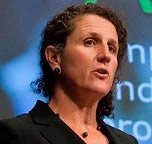See also: The Delhi Rape Case: One Year Later
A year has passed since a gang-rape in New Delhi so brutal it seized headlines and shocked consciences around the world. Incredulous, then anguished and outraged, even practitioners with long experience in addressing such crimes found this case horrific.
In its wake, momentum toward addressing gender-based violence at all levels is building, with new commitments, innovative approaches, and more resources. Increasingly, the World Bank Group is joining this effort.
Violence against women and girls is a global epidemic.
The World Health Organisation (WHO) now estimates that more than one-third of women experience violence during the course of their lives. UN Women has called it “perhaps the most pervasive human rights abuse in the world today.” The Lancet reported this year that women are six times more likely than men to be murdered by intimate partners.
Recognition by nation states of the need for public action is critical.
Significantly, 103 UN member states pledged in March to end violence against women and girls and promote and protect their human rights and fundamental freedoms. Tackling violence against women has emerged as a top priority in discussion of the global targets that will succeed the anti-poverty Millennium Development Goals (MDGs) after 2015. Senior officials and stakeholders from around the world will also assess next year where progress has and hasn’t occurred 20 years after the landmark International Conference on Population and Development, which explicitly linked human rights and gender inequality to pervasive and extreme poverty.
The World Bank Group has historically invested little in addressing gender-based violence—but this is changing fast.
We are investing in knowledge, such as through our pioneering new work on women’s agency and participation, which takes as its starting point that freedom from violence is fundamental.
We are bringing financing to operations on the ground. Just in the last year, 10 new projects with an exclusive or priority focus on sexual or gender-based violence totaling almost US$19 million have been approved.
And policy-based loans in Brazil and Colombia, for example, totaling hundreds of millions of dollars have included key components designed to strengthen government efforts to address the challenge.
We are partnering with the private sector and civil society and innovating—using technology, for example, to find solutions through “Hack-a-thons,” which have generated new mobile apps that connect survivors with prevention or support services.
Freeing women from the scourge and fear of violence is an essential part of empowering them—which can be catalytic in lifting whole societies out of poverty and boosting shared prosperity.
The period ahead presents historic opportunities to shed new light on this global epidemic and forge new strategies and partnerships to tackle it. Recalling the 2012 New Delhi gang-rape reminds us that our mandate to seize these opportunities is urgent.
Jeni Klugman is Director for Gender & Development at the World Bank Group.
A year has passed since a gang-rape in New Delhi so brutal it seized headlines and shocked consciences around the world. Incredulous, then anguished and outraged, even practitioners with long experience in addressing such crimes found this case horrific.
In its wake, momentum toward addressing gender-based violence at all levels is building, with new commitments, innovative approaches, and more resources. Increasingly, the World Bank Group is joining this effort.
Violence against women and girls is a global epidemic.
The World Health Organisation (WHO) now estimates that more than one-third of women experience violence during the course of their lives. UN Women has called it “perhaps the most pervasive human rights abuse in the world today.” The Lancet reported this year that women are six times more likely than men to be murdered by intimate partners.
Recognition by nation states of the need for public action is critical.
Significantly, 103 UN member states pledged in March to end violence against women and girls and promote and protect their human rights and fundamental freedoms. Tackling violence against women has emerged as a top priority in discussion of the global targets that will succeed the anti-poverty Millennium Development Goals (MDGs) after 2015. Senior officials and stakeholders from around the world will also assess next year where progress has and hasn’t occurred 20 years after the landmark International Conference on Population and Development, which explicitly linked human rights and gender inequality to pervasive and extreme poverty.
The World Bank Group has historically invested little in addressing gender-based violence—but this is changing fast.
We are investing in knowledge, such as through our pioneering new work on women’s agency and participation, which takes as its starting point that freedom from violence is fundamental.
We are bringing financing to operations on the ground. Just in the last year, 10 new projects with an exclusive or priority focus on sexual or gender-based violence totaling almost US$19 million have been approved.
And policy-based loans in Brazil and Colombia, for example, totaling hundreds of millions of dollars have included key components designed to strengthen government efforts to address the challenge.
We are partnering with the private sector and civil society and innovating—using technology, for example, to find solutions through “Hack-a-thons,” which have generated new mobile apps that connect survivors with prevention or support services.
Freeing women from the scourge and fear of violence is an essential part of empowering them—which can be catalytic in lifting whole societies out of poverty and boosting shared prosperity.
The period ahead presents historic opportunities to shed new light on this global epidemic and forge new strategies and partnerships to tackle it. Recalling the 2012 New Delhi gang-rape reminds us that our mandate to seize these opportunities is urgent.
Jeni Klugman is Director for Gender & Development at the World Bank Group.


Join the Conversation